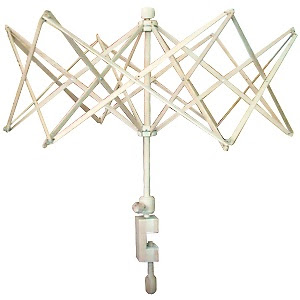Quick Thinking
 This thing is called a swift, or, more precisely, an umbrella swift, but swift will do. You hang a hank of yarn around those ribs, which expand or contract to hold the yarn snugly, and then the main body spins freely so you can wind the hank of yarn into a ball. (You can also use it in reverse, to turn a ball of yarn into a hank, for dyeing.)
This thing is called a swift, or, more precisely, an umbrella swift, but swift will do. You hang a hank of yarn around those ribs, which expand or contract to hold the yarn snugly, and then the main body spins freely so you can wind the hank of yarn into a ball. (You can also use it in reverse, to turn a ball of yarn into a hank, for dyeing.)I lent mine to a friend who returned it today, dropping it off at my workplace. As we were leaving work tonight, several people wanted to know what it was, and I briefly explained it to them, saying, "Every serious knitter has one." They thought maybe a serious knitter who lives in the eighteenth century. But country-Georgian though it may look, it's a very useful article.
Looking the word "swift", might you hazard a guess as to its origin?
I thought, well, it looks very Middle-English-from-Old-English, and the "sw-" at the beginning means it's probably from Old Norse (originating as "sv-") or another of the early Germanic languages. I am always willing to be wrong, and as you know if you read back, I certainly am wrong from time to time. But not this time. Old English did use the word "swift" as we use it most often, as an adjective meaning "quick" (or "quickly turning"), from the verb "swifan", "to move in a course, to sweep". This led to the other meanings of "swift": a quick-flying bird, the rapidly spinning yarn support, and of course any kind of speed, including mental agility (or more likely its lack, when we describe someone as "not too swift").
Now, there are two verbs directly related to "swifan" that you might be able to guess, one of them rather obscure but well-known to readers of Chaucer. The more common one is, charmingly, "swivel", which means "to move in a curve around a fixed point". The other is "swive", which means "to have sexual intercourse". (The slangy "swivet", meaning "a dither; a tizzy; a panic", is unrelated, evidently a made-up word.)
"Swifan" originates from Indo-European "swei-", "to turn, to bend". This also gave English "swoop" (which a swift--the bird--does) and "switch", originally a flexible tree branch, later an equally flexible electrical device.

0 Comments:
Post a Comment
<< Home